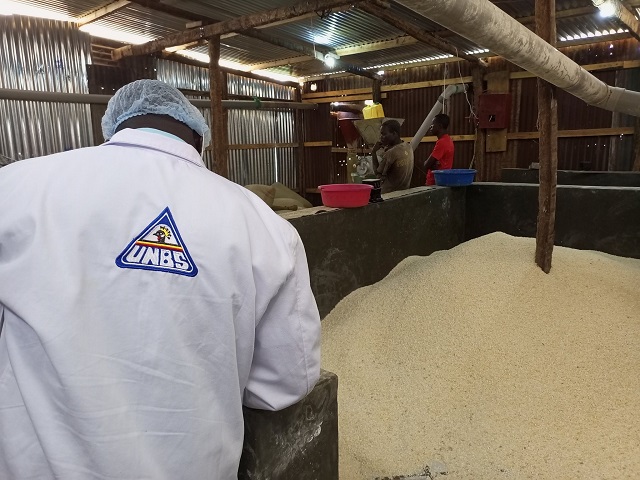
Kampala, Uganda | THE INDEPENDENT | Low capital and lack of consistency are the major hindrances to small-scale industries in acquiring certification for their products from the Uganda National Bureau of Standards-UNBS. All industries are required to acquire certification from UNBS to ensure that their products conform to standards, gain customer confidence and boost their business.
Micro and Small enterprises pay Shs500,000 and Medium and Large enterprises pay Shs1,000,000 for permission to use the quality mark from UNBS valid for one year. The enterprises are also required to pay extra fees for product testing. However, several micro and small scale enterprises in Uganda operate without certification from UNBS, which affects their sales as well as marketing.
Rogers Kakooza, the Director of AVAH Spices Limited in Wakiso district says that he has operated for four years and is yet to acquire certification from UNBS. He cites the high costs involved in testing and certifying the products compared to his capital.
Kakooza adds that UNBS requires the establishment of a planned production plant, which is compliant with proper hygiene practices before a product is certified, which he says is very costly for small-scale industries. Kakooza explains that due to the lack of UNBS quality marks, many small-scale industries work in a panic for fear of impounding their products.
Jennifer Namatovu, a herbalist in Luwero town council says that UNBS also requires that every product is separately certified, which is too costly for her who sells several herbal products for different diseases. Miriam Akaromazima, the Managing Director of Mima Quality Flour and Supplies Limited, says that apart from low capital, there has been a lack of information on the product certification process.
Other small-scale industry operators want UNBS to consider lowering the certification fees and issue them with the quality mark as they improve the standard of their products. UNBS has embarked on regional tours where owners of small scale industries whose products have been certified, share experiences with other players.
The first such tour took place at Negonja Organics Limited in Zirobwe town council in Luwero district on Tuesday. The small scale industry deals with adding value to plantain and jackfruits for export to the USA.
Steven Barasa, the Chief Executive Officer of Negonja Organics Limited, said that although the certification process is considered expensive, some of its requirements are part of what the markets need to gain confidence in the products. Barasa now boasts of three certificates from UNBS and Bureau Veritas Kenya, which enables him to export two products to 800 supermarkets in the USA.
Patience Bageine Ejalu, the Deputy Executive Director in Charge of Standards at UNBS says that the process is not expensive but only that small-scale industries apply for certification for many products yet they have not mastered the consistency and standards.
Bageine adds that the tours will help small-scale enterprises to appreciate the standards before they apply for certification.
According to the UNBS Act (2013 amendment) and Use of UNBS Distinctive Mark, 2018 regulations, all products covered by compulsory standards must be certified and issued with a distinctive mark before they are allowed on the market. Selling products without certification attracts a fine of up to Shillings 20 million or a jail term of not less than three years.
*****
URN
 The Independent Uganda: You get the Truth we Pay the Price
The Independent Uganda: You get the Truth we Pay the Price






If I need my business to be certified with UNBS what should be done and who long does it take to be certified
Will take how long to be certified with unbs certicate to expand my soap production in Uganda as well as the price of testing
Thank you
I need my cosmetic products to be certified but am based in Hoima Kikwite getho youth group how can we be helped are there regional offices here were we can access these services